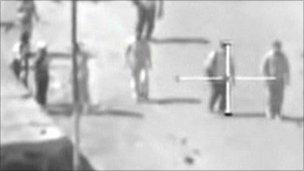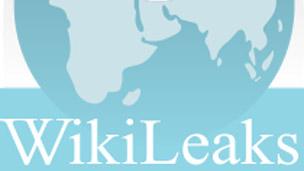Wikileaks encryption use offers 'legal challenge'
- Published
Wikileaks co-founder Julian Assange responds to a BBC question about why it provides encrypted files for download. Video courtesy of the journalists organisation Frontline Club.
A novel use of encryption by whistle-blowing website Wikileaks could "challenge the legal system for years to come," according to an influential observer of the hacking community.
Emmanuel Goldstein, editor of 2600 The Hacker Quarterly magazine, made his comments in reference to an encrypted file recently posted on the site.
Some suspect the file - as yet unopened - contains further sensitive material.
It has been reposted around the web and is available for anyone to download. So far, it has beeen downloaded 100,000 times.
"If you release it in encrypted form, nobody really knows if you've released it or not - or even what the material is," Mr Goldstein told BBC News.
"Then, if something happens to you, all it takes is the revelation of a simple spoken phrase known by a select group of people and everyone who has this mystery file now has all of the secrets."
'Uncrackable file'
Wikileaks recently published 76,000 secret US military logs detailing military actions in Afghanistan; an act the US authorities described as highly irresponsible.
The website now says it will release 15,000 further sensitive documents, once it has completed a review aimed at minimising the risk that the release could put people's lives in danger.
The site came under criticism after it released the first tranche for endangering the lives of informants or others named in the documents.
The release of the logs has led many to wonder what action the US might take against Wikileaks.
Now it seems the site may be using encryption as insurance against legal and other threats to the information it holds.
The insurance.aes256 file has been posted alongside the already published leaked war logs and can be downloaded by anyone.

Some have speculated that the insurance file is another video
From the file name, it is believed that it has been encrypted using the AES256 algorithm - described as "extremely strong" by Professor Whitfield Diffie, of the Information Security Group at Royal Holloway University, London.
Prof Diffie believes that AES256, which he says has been "extensively studied" could prove too tough even for US intelligence agencies to break.
While no-one knows what the insurance file contains, this has not prevented the contents becoming a matter of considerable speculation.
Some suspect that the file contains a further leaked US military video, others that it is another tranche of US military logs - perhaps this time from Iraq. Or it could just be an imaginative bluff.
Even the name of the directory in which it is held - "straw-glass-and-bottle" - has prompted discussion and debate online.
'Historical value'
Speaking at a recent event at London's Frontline Club, Wikileaks founder Julian Assange told attendees how the use of encryption could help overcome legal efforts to prevent publication.
Mr Assange told the BBC that Wikileaks had often distributed encrypted material among its members in order to protect it.
"We have over a long period of time distributed encrypted backups of material we have yet to release," he told the gathering.
"All we have to do is release the password to that material and it is instantly available," he said.
By publishing the encrypted documents publicly, Mr Assange said Wikileaks was protecting material of historical value.
"That duty to history is something that weighs heavily with us. If you had the Stasi archive in your pocket, that is a very heavy pocket indeed," he said.
"We take precautions to make sure that sort of material is not going to disappear from history regardless of the sort of threats to this organisation."
Intelligence test
But with the "insurance file" Wikileaks has taken the unusual step of making an encrypted backup - if that is indeed what it is - publicly available online.
Emanuel Goldstein told the BBC: "Julian is smart. He always has a backup, which is the rule of thumb in this community."
But he believes this goes further than just a need to preserve information.

Wikileaks has come under criticism for its most recent leaks
"It's a fascinating tactic and one which will challenge the legal system for years to come."
In Mr Goldstein's view, any attempt now to seize or prevent publication of material held by Wikileaks will be self-defeating because thousands of copies will already have been distributed world wide.
It is, he says, "a tactic of intelligence to ward off the inevitable clampdown."
But Cindy Cohn, legal director of the Electronic Frontier Foundation is less convinced the file represents a challenge to the US government.
"I don't see it as a challenge, as much as being open about what's going on," she told the BBC.
In Ms Cohn's view the idea of circulating encrypted copies of information to keep it safe is well-established.
The tactic, according to Ms Cohn, has been used in the past by human rights groups and other organisations.
She points to projects like Freenet, which use encryption and wide distribution of data to resist censorship.
"Wikileaks is doing the same basic thing in a more directly political context and using encryption to allow them to be more open about it on the front end."
For Prof Diffie, the release of information in this way does open up interesting possibilities.
"In a sense communications networks can be defined entirely by who has cryptographic keys, and I think a lot of networks will work that way in the future."
That's a view which will not be good news for those trying to prevent groups sharing and publishing leaked material.
"I think that the people who are trying to shut down Wikileaks are going to have to accept this as a fact of reality that cryptography allows you to do this kind of thing," Prof Diffie said.
- Published14 July 2010
- Published7 December 2010
- Published7 June 2010
- Published8 June 2010
- Published6 July 2010